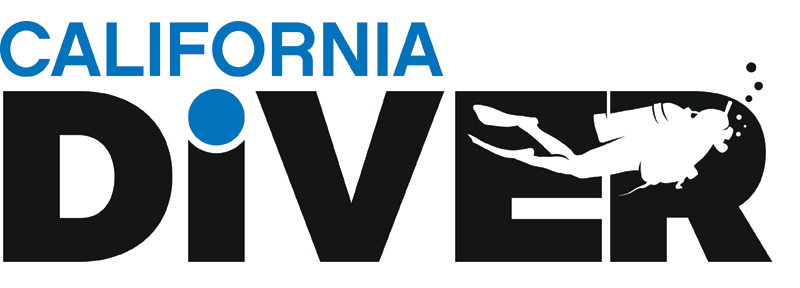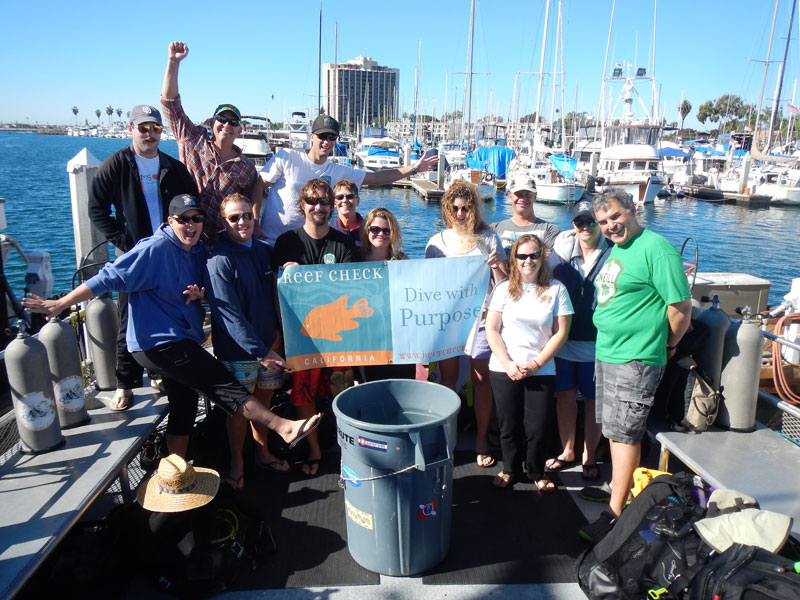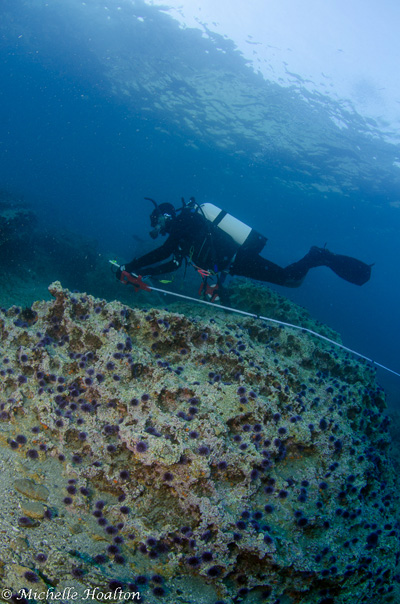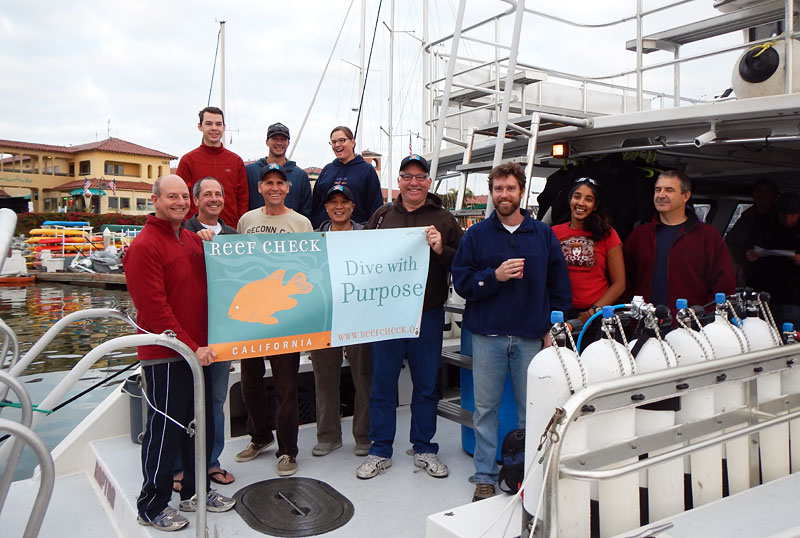I stood on the “landing pad” at the Mendocino Headlands site, also known as Pipeline, catching Humboldt State University students as waves pushed them one at a time onto the flat rocky outcropping which made this site dive-able. I saw the swell coming and signaled Jeremiah to wait, it was too big to catch, yet Jeremiah was already face down in the first wave kicking towards me. The water surged up around me lifting me off my feet at the same time my hand made contact with the first stage of Jeremiah’s tank. The surge pushed us back and around slamming me into the rocks above the landing pad then slamming Jeremiah into me. In the next second the water began to fall away sucking both of us down the slope covered in mussels. My free hand grabbed at anything to prevent us from slipping all the way into the water. We managed to stay on the outcropping and I was able regain my footing and hold on the rocks before the next wave hit. All the while yelling “I got ya buddy, I got ya. You’re doing a good job!” After taking two more waves in this fashion Jeremiah began the steep hike up the rocks and I turned to ready myself for the next diver.
Pipeline is my favorite site along the north coast, the trickiness of the entry and exit is over-shadowed by the splendor of the northern slot. The slot is about 40 feet deep and the western wall is covered in bright pink anemones. Along the bottom large green anemones nestled up to red abalone and giant spine sea starts as kelp greenling’s dart from rock to rock. As the regional manager for Reef Check California I am lucky enough to be one of the select few people on the north coast who get to call this dive site my office.
Story by Reef Check’s North Coast Regional Manager Anna Neumann. Photos as credited.
Reef Check California functions as a subset of the Reef Check Foundation which was found in 1996 by marine ecologist Dr. Gregor Hodgson and is dedicated to empowering people to save our reefs and ocean. The international non-profit organization is dedicated to conservation of two ecosystems: tropical coral reefs and California rocky reefs. With headquarters in Los Angeles and volunteer teams in more than 90 countries and territories, Reef Check works to create partnerships among community volunteers, government agencies, businesses, universities and other non-profits.
Since 2006, Reef Check California has been surveying rocky reefs up and down the coast of California. In 2014 we certified or recertified 233 citizen scientists. Our volunteer citizen scientific divers come from all walks of life and include government employees from the Department of Fish and Wildlife, and NASA to teacher’s, artist and microbiologist. All of our volunteers participate in a two day classroom and pool training then a two day dive practical where they put their new skill to the test in the ocean. They learn how to identify algae, invertebrates, fish and conduct a reef classification survey. Once they finish the training our volunteers are welcome to participate in any of the weekend survey dives that are held up and down the state.
The 2014 year was a busy year for Reef Check divers, besides conducting 73 surveys on sites up and down the coast Reef Check divers did more than just dive! Some of our divers participated in a Speakers Bureau training where they learned how to give presentations about Marine Protected Areas and how Reef Check is going about monitoring them. A few of the divers from the speaker’s bureau training also where featured in a new Reef Check promotional video!
Our divers were also given the opportunity to get out in local communities to share their love and knowledge of the ocean. With the help of the Ritz Carlton, Laguna Niguel in Dana Point Reef Check gave children and adults a close encounter marine life in Salt Creek. The day included presentations by marine biologist and a guided exploration of tide pools. The children were also given the opportunity to check out our volunteers divers decked out in full survey gear and try their hand at navigating two transects lines laid out on the sand.
Another event hosted in Dana Point brought school children and local community members out to the Channel Islands where Remotely Operated Vehicles equipped with cameras followed our divers around on a survey and allowed the group above to check out what a real marine survey looks like. On the north coast Reef Check supporters shared their stories and photographs at the Crab-Cook Off in Fort Bragg showing locals that they could not only identify crabs underwater but which booth served better crab cakes!
This year also saw changes in the staff at Reef Check California. Long time central coast manager Megan Wehrenberg and her husband Jonah (also a Reef Check volunteer) set sail on the great Pacific Ocean and Reef Checker Dan Abbott swooped in flawlessly to fill her spot. Dan has been diving with Reef Check since 2005 and was a part of the first Reef Check survey in California! Reef Check also brought Leigh Erickson onboard to be the new Social Media Manager. Her expertise in navigating the online world has help spread the word about the Reef Check Foundation and Reef Check California. The expansion of the Reef Check team to northern California also allowed myself to become part of the Reef Check team. Since May of 2014 I have been living and working in the Mendocino area and have begun baseline monitoring on the Marine Protected Areas that dot the northern California coastline. We conducted our second training in Fort Bragg and were able to survey seven sights this year!
Now that the 2015 year is upon us, Reef Check is looking forward to training a new batch of divers and getting back out in the water. The new 2015 training schedule is up on the Reef Check website with the first trainings set to start in May. If you are interested in having a Reef Check diver talk at an event feel free to contact Marylin Brody at mbrody@reefcheck.org , or contact rcinfo@reefcheck.org if you have questions about the Reef Check Foundation or Reef Check California. To keep up to date with Reef Check events and news you can follow us on Facebook, Twitter (@ReefCheck), or Instagram (@ReefCheck) .



